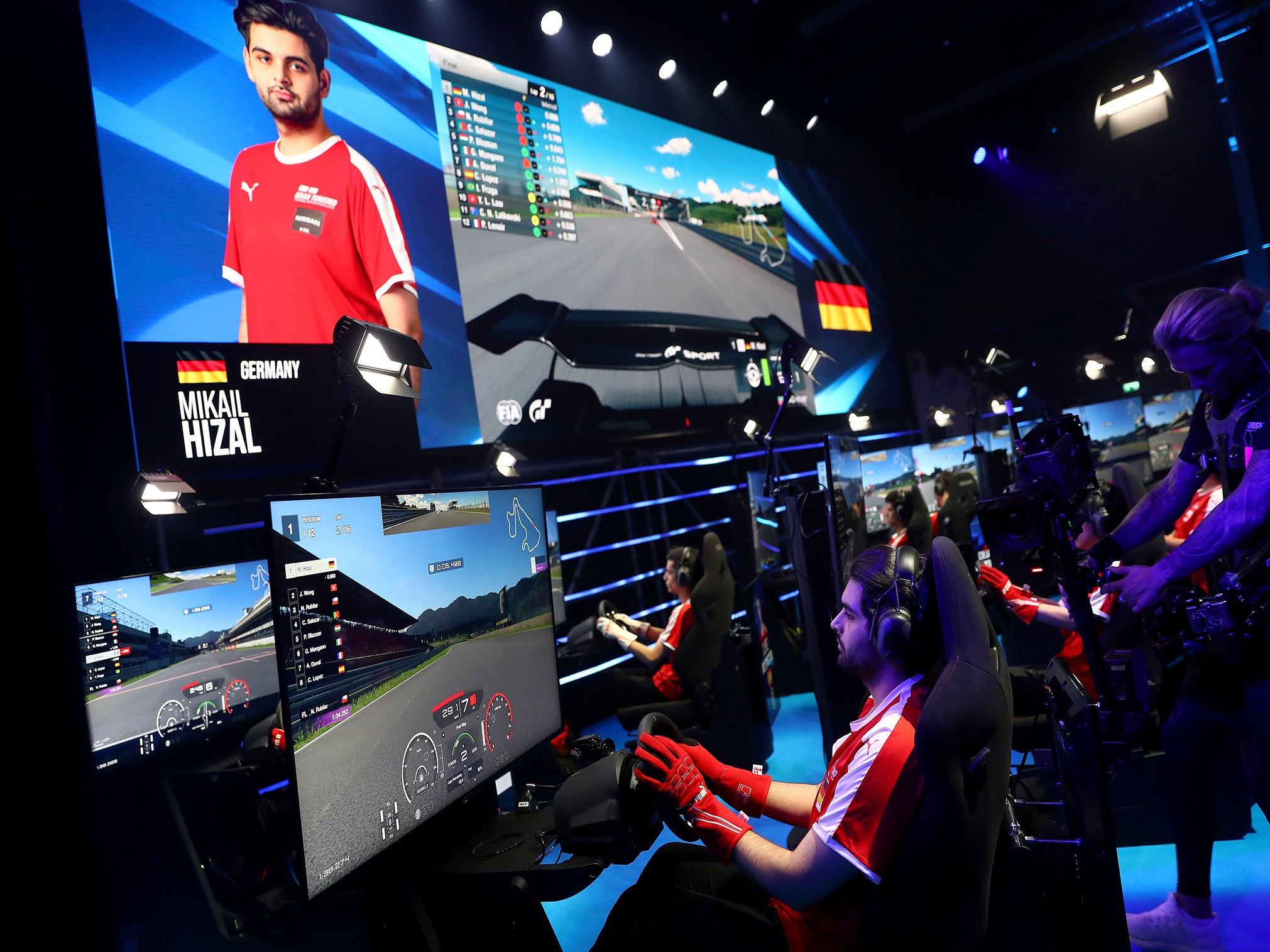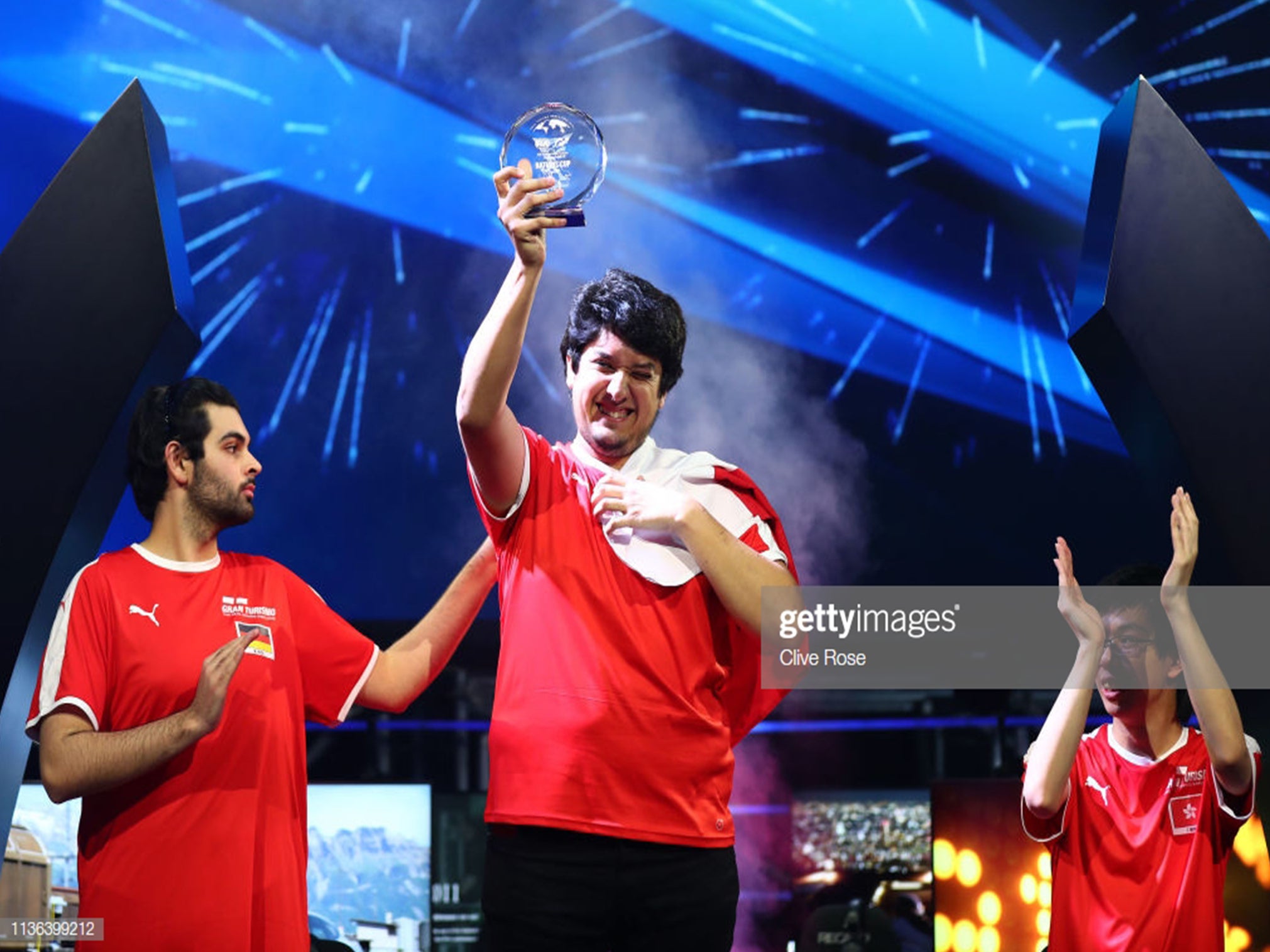Esports players are training like traditional athletes to enhance performance
The virtual athletes are trading in their previously sedentary and unhealthy lifestyles for yoga mats, protein smoothies and breathing exercises.

Your support helps us to tell the story
From reproductive rights to climate change to Big Tech, The Independent is on the ground when the story is developing. Whether it's investigating the financials of Elon Musk's pro-Trump PAC or producing our latest documentary, 'The A Word', which shines a light on the American women fighting for reproductive rights, we know how important it is to parse out the facts from the messaging.
At such a critical moment in US history, we need reporters on the ground. Your donation allows us to keep sending journalists to speak to both sides of the story.
The Independent is trusted by Americans across the entire political spectrum. And unlike many other quality news outlets, we choose not to lock Americans out of our reporting and analysis with paywalls. We believe quality journalism should be available to everyone, paid for by those who can afford it.
Your support makes all the difference.The squats and leg lifts are harder than they look, and after a few sets, Alfonso Aguirre Rodriguez places his hands on his knees and tries to compose himself.
In November, Aguirre, a 24-year-old professional video game player from Spain, joined the five-man roster of Origen, a League of Legends team that competes in the game’s top European league. The players – all signed in the autumn – were told at the time that the team might be run a bit differently from what they were accustomed to. Now here they are, five young men who make their living sitting almost completely still in front of desktop computers, sweating through an hour-long workout in a cramped gym.
“I think I’m going to puke my oatmeal,” says Aguirre, who is known in the gaming community as Mithy. “I’m dying.”
Some years ago, traditional sports leagues were revolutionised by young analysts wielding computers. The way things had always been done, it turned out, was not always the best way to do things. Now echoes of that transformation have arrived in the growing world of professional esports, where gamers are being shepherded towards a new frontier, oddly, by the old, corporeal wisdom of traditional sports.
The debate about whether competitive gamers can be considered athletes may never end. In the meantime, though, gamers are increasingly acting like them.
Origen is one of two teams owned by Rfrsh Entertainment, an esports company based in Copenhagen. Two years ago, the organisation hired Kasper Hvidt, a former captain of Denmark’s national handball team, to be its sporting director. Hvidt, 43, had no previous exposure to gaming. But that was the point.
In recent years esports have crept into the mainstream, attracting new fans, new sponsors and new investment. The top professionals now make six-figure salaries and earn even more with endorsements and prize money. And yet, Hvidt observes, their approach to performance remained amateurish.
Eating right, sleeping right, exercising, cleaning up for sponsors – these ideas have anchored traditional sports for generations. In esports, they are regarded as almost radical.

“They don’t look at themselves as physical human beings,” says Hvidt, who won the European handball championship with Denmark in 2008. “It’s common sense, in a way. But with them, it was not.”
Rfrsh has a validating narrative under its belt. The company’s other team, Astralis, which competes internationally in the first-person shooter game Counter-Strike: Global Offensive, had gone almost a year without winning a tournament when Hvidt joined the organisation in mid-2017. In 2018, the team earned $3.7m (£2.8m) in prize money while putting together one of the most dominant years ever by any team in any esports game.
And so Origen this year has set off on the same journey of athletic self-improvement. As recently as last year, the players’ typical day might have been a sedentary extravaganza of sugary energy drinks, fast food and unresolved psychic tension. Now, their days are interposed with protein smoothies, yoga mats and slow-paced breathing exercises.
The effects of those changes, the team says, have been plain to see: after starting the current season with a 1-4 record, Origen went on a tear, winning 11 of its final 13 matches, finishing the regular season in second place and securing a first-round bye for the playoffs, which began last Friday.
“These are little things,” says Fabian Broich, Origen’s assistant coach. “But they add up, and over the long term you have a more emotionally stable team and a more focused team.”
At Rfrsh, Hvidt has assembled a performance team – a physical trainer, a sports psychologist, a massage therapist, a medical doctor and a nutritionist – and constructed a lifestyle plan for the players that combines scientific research, old-school sports wisdom and simple common sense. Broich, 28, a former professional soccer player from Germany, acts as a liaison between the management team and the players, implementing the principles on the ground.
The players, who hail from five European countries and range in age from 18 to 24, live in Denmark and fly each weekend to Berlin, where the League of Legends matches are taped in front of a boisterous studio audience. In Copenhagen, they are required to get around by bicycle (a rule they all hated at first) and have fitness and yoga classes during the week. On Mondays, they meet with the team psychologist for an “empty-the-backpack” session.
Every morning the team meets for breakfast in Broich’s apartment, a ritual designed in part to get the gamers – night owls and notoriously late risers – out of bed at a reasonable hour. Their other meals are catered with guidance from the nutritionist.
“Before, I would go to sleep at 5am and wake up at 2pm the next day, eat McDonald’s two times, and that’d be it,” says 18-year-old Patrik Jiru, an Origen player from the Czech Republic, as he eats a salmon and vegetable omelette.
After breakfast, the players bike to the gym for a core workout and a physical therapy session.
“Last time we did this, my body was sore for three days,” says Jonas Andersen, 24, an Origen player from Denmark known as Kold, as he grabs a medicine ball.
Mikkel Hjuler, a trainer who works with Danish Olympians, guides the team through some gaming-specific exercises. He has the players wrap their fists inside elastic bands and flex their fingers. He teaches them a neck exercise favoured by boxers.
The players are willing participants, but they admit that their ambitions, from a physical standpoint, were modest.
“I’m OK with being chubby as long as I don’t pass out when I’m running – which, right now, I might,” Aguirre says.

The players continue to train several hours a day in front of computers, but even those sessions now borrow elements from traditional sports.
Before a scrimmage session at the Rfrsh headquarters, Broich distributes magnesium pills and protein bars. (He keeps vitamin D and krill oil in his arsenal, too.) Later, he blends a potpourri of nutritional supplements – moringa, matcha, maca, chlorella, açaí and a half-dozen others – into a thick protein shake.
In their meeting room, a quote attributed to former NBA coach Phil Jackson – “The strength of the team is each individual member” – is scribbled on a whiteboard. After one practise game, the team lay out yoga mats and stretch on foam rollers.
Trevor Henry, 31, a broadcast commentator for Riot Games, the company behind League of Legends, marvels at how quickly the game’s competitive landscape was professionalising. He is happy, for instance, that some teams are reconsidering their use of gaming houses, a classic esports setup in which players live and train together under one roof.
“Go back just a few years: professional players would play 10 to 11 hours every day and do takeout food every day,” Henry says. “Pizza boxes would stack up rooms. Laundry would never get done. I’ll be brutally honest: teams didn’t wash the team shirts. They’d have the same team shirt that they’d wear 24 weeks in a year that has never seen detergent.”
This lifestyle – part monk, part fraternity brother – was not only accepted but also held up as the very reason the players were successful. But that wisdom is now being challenged, and in Europe, the shift by League of Legends this year to a 10-team, franchise model (akin to American sports leagues) has encouraged organisations to make more long-term investments.
Last year, Fabien Devide, the chair of Team Vitality, a French gaming organisation, spent seven months embedded in his League of Legends team’s gaming house in Berlin. He was startled by what he saw.
“It was a madhouse,” Devide says, describing an atmosphere with an utter lack of boundaries between personal and professional life. “It can become a toxic environment very quick.”
Devide says Team Vitality plans to move its players into separate apartments later this year. Acknowledging the pioneering example of Rfrsh, he says he is formalising plans to open a training centre for his organisation in Paris and hire a performance director, in the mould of Hvidt, to devise a programme grounded in traditional sports ideas.
Teams now understand that championships are won and lost in the details. When Origen was assembling its squad last year, Hvidt asked potential signees to complete a personality test with hundreds of questions to make sure it was building an emotionally compatible group.
In December, the players convened for a preseason camp with one catch: no computers. Instead, the players spent several days completing trust exercises and discussing their dreams with Lars Robl, a sports psychologist who spent two decades in the Danish special forces – “the real Counter Strike,” he joked – and whose other clients include the Danish soccer club FC Midtjylland.
Robl’s job now is to help the gamers see themselves as elite athletes, just like the soccer players.
“They have the same DNA,” Robl says. “They’re just not aware of it yet.”
© New York Times
Join our commenting forum
Join thought-provoking conversations, follow other Independent readers and see their replies
Comments